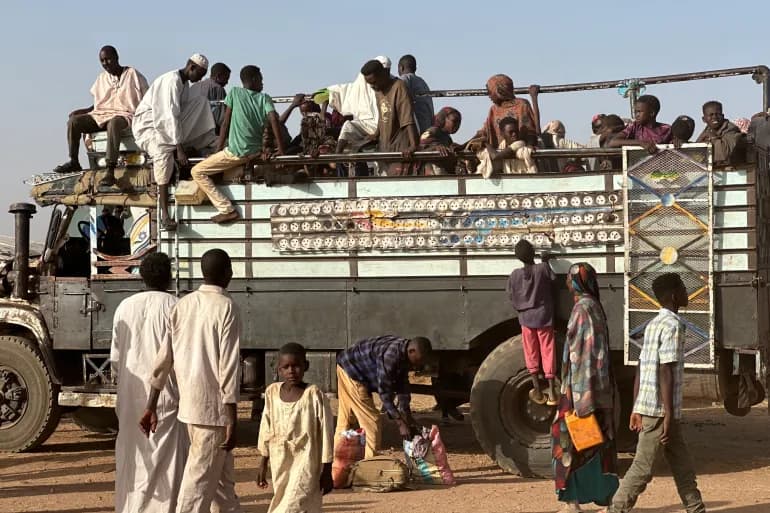We're loading the full news article for you. This includes the article content, images, author information, and related articles.
The paramilitary Rapid Support Forces' claim to have seized el-Fasher, the Sudanese army's last Darfur stronghold, signals a pivotal shift in the 18-month civil war, intensifying a catastrophic humanitarian crisis and raising the stakes for regional stability.

Sudan's paramilitary Rapid Support Forces (RSF) announced on Sunday, October 26, 2025, that they have captured the Sudanese Armed Forces' (SAF) 6th Infantry Division headquarters in el-Fasher, the capital of North Darfur. This move, if confirmed, would give the RSF effective control over the entire Darfur region, a vast area in western Sudan. The RSF released a statement describing the capture as a "historic victory" and a "pivotal moment" that alters the trajectory of the country's devastating civil war, which began in April 2023. The Sudanese army has not yet issued an official comment on the situation. However, local pro-army groups, the Popular Resistance, have contested the claim, accusing the RSF of a "misleading media campaign" aimed at causing panic.
The battle for el-Fasher has been the epicenter of what the United Nations calls one of the world's worst humanitarian crises. For over 18 months, the city has been under a brutal siege by the RSF, trapping an estimated 250,000 to 300,000 civilians. UN Emergency Relief Coordinator, Tom Fletcher, expressed deep alarm at the situation on Sunday, stating that "hundreds of thousands of civilians are trapped and terrified – shelled, starving, and without access to food, healthcare or safety." Humanitarian access has been almost completely cut off, with aid convoys blocked for months. A report by the medical humanitarian group MedGlobal in October 2025 found acute and widespread malnutrition, with one in five children under five being acutely malnourished. The conflict has displaced over 11.7 million people across Sudan, with 4.2 million fleeing to neighboring countries.
El-Fasher was the last of the five Darfur state capitals held by the SAF. Its fall would not only be a major military setback for the government but could also accelerate the fragmentation of Sudan. The RSF has already established a parallel administration in Darfur, and full control of the region would solidify its base of power. This development raises fears of intensified ethnic violence, as the RSF, which evolved from the Janjaweed militia, has been accused by the United States of committing genocide against non-Arab populations in Darfur. The conflict's escalation poses a significant threat to regional stability, fueling arms proliferation and refugee flows into already strained neighboring countries like Chad and South Sudan.
The shifting dynamics in Sudan place Kenya in a complex diplomatic position. Nairobi has historically played a key role as a mediator in regional conflicts, including facilitating the 2002 Machakos Protocol that ended a previous Sudanese civil war. However, the current administration under President William Ruto has faced accusations from the Sudanese government of siding with the RSF. These accusations intensified after Kenya hosted RSF-aligned groups in Nairobi in February 2025, a move Khartoum viewed as a "declaration of hostility." The Kenyan government has consistently denied these claims, reiterating its commitment to neutrality and a peaceful, negotiated solution through bodies like the Intergovernmental Authority on Development (IGAD) and the African Union (AU). Both the AU and IGAD have repeatedly called for a ceasefire, warning that there is no military solution to the crisis and that external interference risks prolonging the war.
The fall of the army headquarters has prompted renewed international calls for an immediate ceasefire and unimpeded humanitarian access. The UN has reminded all parties of their obligations under Security Council Resolution 2736, which demands an end to the siege of el-Fasher and the protection of civilians. The International Criminal Court is investigating ongoing war crimes and crimes against humanity in Darfur. As the RSF tightens its grip on a strategic region, the international community faces mounting pressure to prevent further atrocities and address a humanitarian crisis spiraling out of control, with significant implications for the Horn of Africa.
Keep the conversation in one place—threads here stay linked to the story and in the forums.
Sign in to start a discussion
Start a conversation about this story and keep it linked here.
Other hot threads
E-sports and Gaming Community in Kenya
Active 9 months ago
The Role of Technology in Modern Agriculture (AgriTech)
Active 9 months ago
Popular Recreational Activities Across Counties
Active 9 months ago
Investing in Youth Sports Development Programs
Active 9 months ago